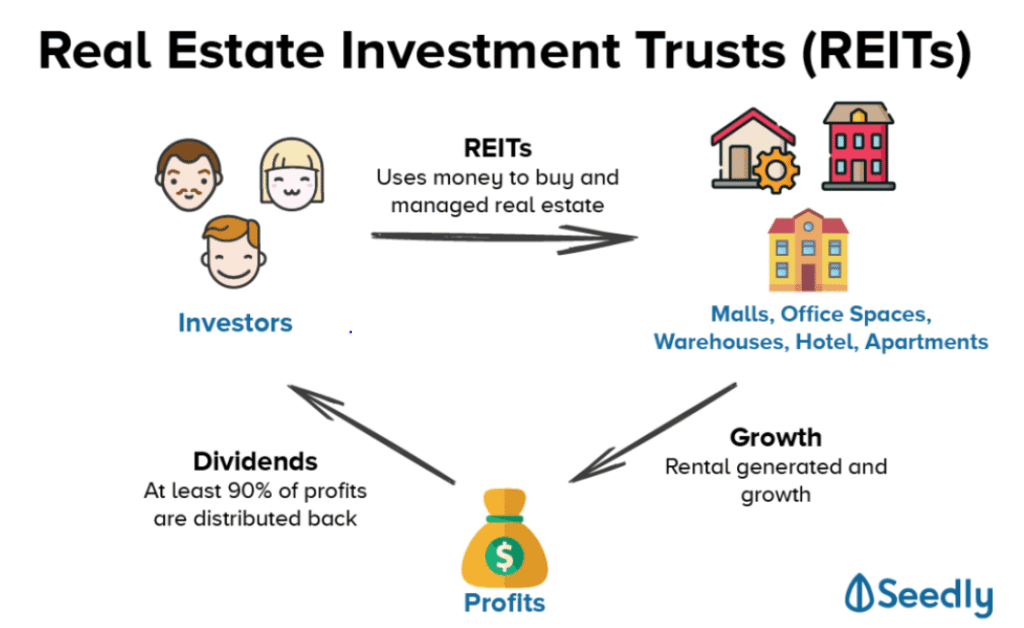Real Estate Investment Trusts (REITs) are transforming the way people invest in real estate—by allowing small investors to earn returns from income-generating properties without owning land or buildings directly.
In Kenya, REITs in Kenya are still emerging but gaining traction among institutional and retail investors. Whether you’re looking for passive income , portfolio diversification , or long-term appreciation , REITs offer a modern, hands-off approach to real estate investment.
📌 What Are REITs?
A Real Estate Investment Trust (REIT) is a company that owns, operates, or finances income-generating real estate such as malls, office towers, hotels, or warehouses.
Instead of buying property outright, you buy shares in a trust—and receive regular dividends from rental yields .
Key Features:
- Minimum investment required
- Passive income through dividends
- Regulated by the Capital Markets Authority (CMA)
- Transparent and liquid compared to traditional real estate
📌 Example: If you own shares in a Nairobi mall REIT, you earn a portion of the rental income paid by tenants.

🧾 Types of REITs in Kenya
Here are the main types of REITs currently being explored or launched:
| Type | Description |
|---|---|
| Equity REITs | Owns and manages commercial properties like malls and office towers |
| Mortgage REITs | Lends money to property owners or buys mortgage-backed securities |
| Hybrid REITs | Combines equity and mortgage models |
📌 Kenya’s market is currently dominated by Equity REITs due to strong commercial real estate growth.
🔝 Top REITs Available in Kenya (2025)
While still relatively new, a few key players are shaping Kenya’s REIT landscape:
| REIT Name | Operator | Focus Property |
|---|---|---|
| Centum REIT | Centum Investment Company | Garden City Mall, Two Rivers Mall, and residential towers |
| Britam REIT | Britam Holdings | Commercial buildings and asset management |
| Nairobi REIT Fund | Local fund managers | Office and retail space in Nairobi CBD |
| Industrial REIT | Private Equity Firms | Warehouses and logistics-linked developments |
| Coastal REIT | Mombasa-based investors | Hotels and resorts along the Kenyan coast |
📌 These trusts allow small investors to benefit from large-scale developments without managing property directly.
📊 Expected Returns from Kenyan REITs
Investing in REITs can provide regular income and long-term capital gains:
| REIT Type | Average Annual Dividend Yield | Capital Appreciation Potential |
|---|---|---|
| Retail Mall REITs | 6% – 10% | Moderate |
| Office Space REITs | 7% – 12% | Strong |
| Industrial REITs | 8% – 14% | High |
| Coastal Tourism REITs | 6% – 10% | Seasonal variation |
📈 Compared to traditional savings accounts or bonds, REITs offer superior returns and stability.
🧭 How to Invest in REITs in Kenya
Here’s how you can start investing:
Step 1: Open a CDS Account
To trade REITs listed on the Nairobi Securities Exchange (NSE), you need a Central Depository & Settlement (CDS) account .
Step 2: Choose a REIT
Research available REITs and select one based on your goals and risk appetite.
Step 3: Buy Units or Shares
You can invest in REITs through:
- The NSE (for publicly traded REITs)
- Private funds (offered by developers or banks)
📌 Minimum investment varies—from KES 100,000 upwards depending on the fund.
📈 Benefits of Investing in REITs in Kenya
| Benefit | Explanation |
|---|---|
| Low Entry Barrier | Start with as little as KES 100,000 |
| Passive Income | Earn regular dividends from rental income |
| Diversification | Spread risk across multiple properties |
| Professional Management | No need to manage tenants or maintenance |
| Transparency | Publicly listed REITs publish quarterly reports |
📌 REITs are ideal for retirement planning, portfolio diversification, and steady income generation.
🚨 Risks and Challenges of REITs
Like any investment, REITs come with risks:
| Risk | Explanation |
|---|---|
| Market Volatility | REIT values can fluctuate with economic conditions |
| Tenant Vacancies | Low occupancy affects dividend payouts |
| Regulatory Gaps | Kenya’s REIT framework is still evolving |
| Limited Options | Only a few REITs are active in Kenya today |
| Developer Reliance | Returns depend on the success of underlying projects |
📌 Always review the REIT’s prospectus and consult a licensed financial advisor before investing.
🏢 How REITs Work With Major Developers
Some of Kenya’s top developers are exploring or already operating under REIT structures:
| Developer | REIT Involvement |
|---|---|
| Centum Investment Co. | OperatesCentum REIT, focusing on Garden City and Two Rivers Mall |
| Britam Properties | Offers REIT-linked income opportunities through asset management |
| Home Afrika Limited | Exploring REIT options for future housing schemes |
| Sameer Africa | Considering commercial REIT for Karen Country Homes and Muthaiga Villas |
| Garden City Group | Part of Centum REIT offering |
📌 These firms partner with the Capital Markets Authority (CMA) to ensure legal compliance.

📉 Market Trends Driving REIT Growth in Kenya
Several factors are making REITs more attractive:
| Trend | Impact |
|---|---|
| Government Housing Programs | Encouraging alternative financing models |
| Digital Platforms | Easier access to REITs via mobile apps and online brokers |
| Smart Cities Development | Tatu City and Konza attract institutional REIT investment |
| Rising Demand for Passive Income | More investors seek stable returns without direct ownership |
| Foreign Investor Interest | REITs appeal to expatriates and diaspora investors |
📈 As the sector matures, more REIT options will become available to local investors.
Frequently Asked Questions (FAQs)
Q1: Are there REITs in Kenya?
A1: Yes, Kenya launched its first REIT in 2020—offering small investors access to income-generating commercial properties.
Q2: Can I invest in REITs with KES 100,000 or less?
A2: Some REITs allow small investments through digital platforms and NSE-listed funds.
Q3: Is investing in REITs safe in Kenya?
A3: Yes—if you choose CMA-regulated REITs and conduct proper research.
Q4: Do REITs pay dividends?
A4: Yes—REITs distribute at least 80% of annual profits to investors as dividends.
Q5: Can foreigners invest in Kenyan REITs?
A5: Yes—through local brokerage platforms or digital investment apps linked to the Nairobi Securities Exchange.
